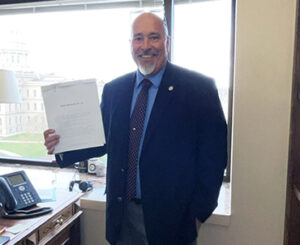Public safety fund advances out of House
 In a powerful show of bipartisan cooperation, the Michigan House of Representatives this week passed House Bills 4260–61, legislation that establishes a long-awaited Public Safety and Violence Prevention Fund. The bills represent a major commitment by state lawmakers to address violent crime and strengthen public safety.
In a powerful show of bipartisan cooperation, the Michigan House of Representatives this week passed House Bills 4260–61, legislation that establishes a long-awaited Public Safety and Violence Prevention Fund. The bills represent a major commitment by state lawmakers to address violent crime and strengthen public safety.
The fund will be created by earmarking a portion of the state’s sales tax revenue, with approximately $115 million projected for deposit in the upcoming fiscal year. This new financial mechanism marks a significant and coordinated statewide investment in both law enforcement and community-based violence prevention initiatives.
Distribution:
- 2 percent of the fund will go to the Crime Victim’s Rights Fund, which provides essential support and services to victims of crime.
- 2 percent will be allocated to the Michigan Department of Health and Human Services (DHHS) to administer a competitive grant program aimed at helping local governments implement public health-based violence intervention strategies.
- $70 million will be distributed to cities, villages, and townships for public safety improvements and violence prevention programs. These allocations will be based on local violent crime rates.
- The remaining balance, expected to be around $40 million, will be directed to county sheriffs, supporting targeted efforts to reduce violent crime at the county level.
The inclusion of county sheriffs in the funding formula is a key change from earlier versions of the legislation, which had originally excluded counties from eligibility. MAC played a leading role in advocating for this adjustment, ensuring that counties could access critical resources.
This fund has long been a shared priority for the Legislature and Governor’s Office. With the bills headed to the Senate, MAC and other stakeholders anticipate smooth passage.
For more information on this issue, contact Deena Bosworth at bosworth@micounties.org.
House committee votes for bills to repeal energy siting statute
 Two bills aimed at repealing recent changes to how large-scale renewable energy projects are permitted in Michigan advanced this week in the state House, signaling renewed momentum for local control in siting decisions. House Bills 4027-28, by Rep. Greg Alexander (R-Sanilac), were voted out of committee and are now headed to the full House.
Two bills aimed at repealing recent changes to how large-scale renewable energy projects are permitted in Michigan advanced this week in the state House, signaling renewed momentum for local control in siting decisions. House Bills 4027-28, by Rep. Greg Alexander (R-Sanilac), were voted out of committee and are now headed to the full House.
The legislation targets Part 8 of the Clean and Renewable Energy and Energy Waste Reduction Act, which was added to state law in 2023. That provision established a state-run certification process through the Michigan Public Service Commission (MPSC) for siting large-capacity wind, solar and energy storage facilities — a process that preempted local zoning authority in most cases.
HB 4028 would repeal Part 8 entirely, effectively removing the MPSC’s authority to certify and override local decisions on major renewable energy developments.
HB 4027 would amend the Michigan Zoning Enabling Act to eliminate language tying local zoning ordinances to Part 8 and remove provisions that shield certain renewable energy projects from local review or modification once construction milestones or minimal financial thresholds are met.
MAC testified in support of the legislation this week, emphasizing the importance of local decision-making in land use and development.
When Part 8 was added to Michigan law in 2023, it was framed as a method to streamline the permitting of large-scale renewable energy infrastructure necessary for the state to meet its ambitious clean energy goals.
While the law allowed some communities with aligned ordinances to retain limited permitting authority, those provisions were seen by MAC as too narrow and administratively burdensome to be practical.
HBs 4027-28 are expected to pass the full House, then move to the Senate, where their prospects are uncertain.
For more information on this issue, contact Deena Bosworth at bosworth@micounties.org.
House considers adding Michigan to national nursing compact
 On Tuesday, the Michigan House Health Policy Committee heard testimony on House Bill 4246, by Rep. Phil Green (R–Tuscola), which would add Michigan to the national Nurse Licensure Compact. This would allow nurses licensed in other participating states to practice in Michigan without needing to obtain a separate state license.
On Tuesday, the Michigan House Health Policy Committee heard testimony on House Bill 4246, by Rep. Phil Green (R–Tuscola), which would add Michigan to the national Nurse Licensure Compact. This would allow nurses licensed in other participating states to practice in Michigan without needing to obtain a separate state license.
More than 40 states entered the compact, either fully or in part. MAC and the Michigan County Medical Care Facilities Council support this legislation, as it has the potential to attract new nurses to the state and make it easier for out-of-state nurses to work here — especially in border counties in the Upper Peninsula and Southern Michigan.
The committee is expected to soon vote out the bill to the full House.
For more information, contact Jimmy Johnson at johnson@micounties.org.

Rep. Steve Frisbie holds a copy of HR 62, which designates April as National County Government Month in Michigan.
April designated as County Government Month via House resolution
A legislative resolution sponsored by MAC was among activities in April to mark National County Government Month.
Rep. Steve Frisbie, a former Calhoun County commissioner now serving his first term in the Michigan House of Representatives, sponsored a resolution (HR 62) on MAC’s behalf to recognize the annual event, which started in 1991. The resolution was adopted by the House on April 17.
“It was Tocqueville who said that the strength of a free people resides in the local community,” said Frisbie. “As a county commissioner for 14 years, I worked up close with fellow county governments to meet the needs of our residents. Whether it’s administering justice through the courts, helping to care for children, or assisting in disaster relief, county governments play a crucial role in the delivery of key services, and I am proud to introduce this resolution.”
For more information on National County Government Month, click here.
Podcast 83 reviews public safety, road funding, energy siting actions
 In this week’s episode of Podcast 83, Executive Director Stephan Currie and Director of Governmental Affairs Deena Bosworth have a one-on-one chat about a busy number of days in Lansing last week on:
In this week’s episode of Podcast 83, Executive Director Stephan Currie and Director of Governmental Affairs Deena Bosworth have a one-on-one chat about a busy number of days in Lansing last week on:
Public safety fund legislation: House Bills 4260-61 in their current form have commendable points, said Bosworth, including millions aimed specifically at county sheriff departments.
Road funding hearing: “There was great testimony and good questions by the Senate Appropriations Committee members,” said Bosworth. “In addition to the House Republican testimony on their road plan, we also heard from the Citizens Research Council on a new policy paper that they issued where they said they don’t know if we necessarily need any more money. We just need to reallocate the funds and spend them better.”
“So why would the Senate take testimony on a House Republican plan when the Democrats control the Senate,” Currie asked.
“I think they wanted to poke holes in it,” Bosworth replied. “Frankly, I really do. I think that they’re focused on getting together their own plan with the Governor’s Office and how they want to tackle the road issue.”
Renewable energy siting legislation: “House Bills 4027-28 are up for hearing this week in the House Energy Committee, and they amend that clean and renewable energy and energy reduction act that went through (in 2023),” Bosworth said. “MAC remained opposed to that as it was going through the process, because it really stripped local units of government, of local control, of the siting of these large-scale wind and solar facilities.
“So, these bills (would repeal) the majority of that statute: all that Michigan Public Service Commission authority to site these large-scale wind and solar facilities; the standards that have to be written … it really gets rid of all of that. …
“That would be great if we went back to more local control, so the locals had more of a say in what was going into their own communities,” Bosworth continued. “But I highly doubt this is going to go anywhere in the Senate. It might. It may end up opening up the act for some of the fixes that are needed, but I don’t think it’s going to be really high up on their priority list.”
To view the full episode, recorded on April 21, click here.
Previous episodes can be seen at MAC’s YouTube Channel.
And you always can find details about Podcast 83 on the MAC website.
Document details spending, reporting rules for national opioid settlements
 MAC is spotlighting the release of a key new document detailing the spending and reporting requirements for the National Opioid Settlements. This guidance supports counties in interpreting the terms of each settlement and aligns with MAC’s ongoing efforts to provide technical assistance and ensure informed local decision-making.
MAC is spotlighting the release of a key new document detailing the spending and reporting requirements for the National Opioid Settlements. This guidance supports counties in interpreting the terms of each settlement and aligns with MAC’s ongoing efforts to provide technical assistance and ensure informed local decision-making.
Each settlement outlines how funds must be spent, with a strong emphasis on “Opioid Remediation” activities, specifically care, treatment, prevention, and recovery services. While most settlements require at least 85 percent of funds to be used for remediation, others such as CVS, Walgreens and Kroger require up to 95.5 percent. These differences make it essential for counties to understand the specific terms tied to each source of funding.
Reporting requirements also vary by settlement. CVS mandates annual reporting by Jan. 31, while the remaining agreements require biannual reports submitted through the BrownGreer portal, with deadlines at the end of March and September. Counties must also publicly disclose any funds used for non-remediation purposes, such as legal or administrative costs, to maintain transparency and accountability.
MAC remains committed to supporting counties through this process, offering guidance, tools, and individualized support to help local governments align with settlement documents and make the most of these crucial resources. The document and other helpful materials can be found on MAC’s Opioid Settlement Resource Center.
Treasury webinar on May 8 will give sick time rules update
 The Michigan Department of Treasury is pleased to announce our next Chart Chat webinar at 2 p.m. on Thursday, May 8, 2025. The webinar series provides local governments with critical information related to accounting and auditing topics, measuring local government fiscal health, and other important updates.
The Michigan Department of Treasury is pleased to announce our next Chart Chat webinar at 2 p.m. on Thursday, May 8, 2025. The webinar series provides local governments with critical information related to accounting and auditing topics, measuring local government fiscal health, and other important updates.
Topics covered will include:
- Earned Sick Time Act Update
- Reading Financial Statements
- Data, Statistics, Ratios
Participants can register and submit questions prior to the webinar by clicking here.
Presentations and recordings from this webinar, along with previous webinars, can be found at TREASURY – BLGSS Learning Center. For support related to Treasury’s local government services, visit TREASURY – Contact Information.
 Staff picks
Staff picks
- State grant to fund generators for Northern Michigan counties (WCMU Public Radio)
- Could no-strings-attached ‘cash prescriptions’ slash poverty among Michigan’s youngest? (Detroit Free Press)
- Studies raise warnings about Michigan child care access, cost (Bridge Michigan)
- Uncertainty in borrowing costs may be ahead for Michigan’s local governments (Citizens Research Council of Michigan)
